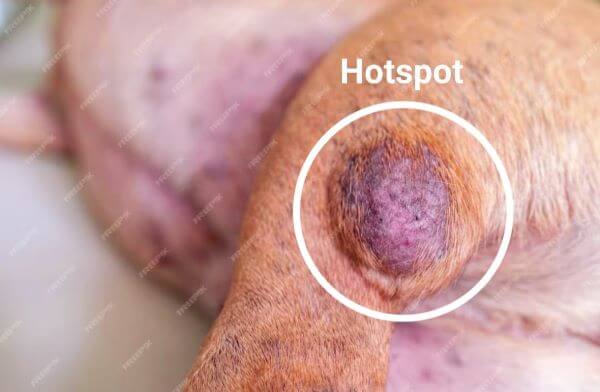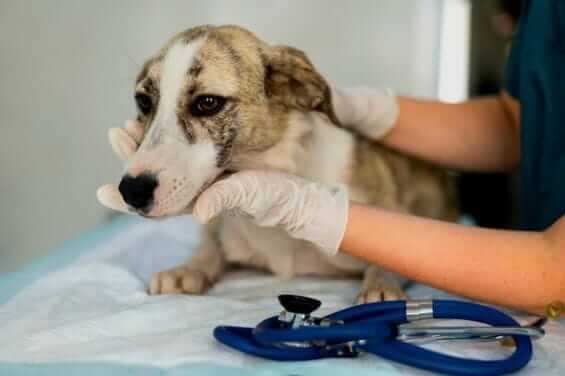Diarrhea is a gastrointestinal condition in which there is a frequent passage of loose, watery, and unformed stools. Diarrhea occurs when the absorption of water and electrolytes in the intestines is disrupted. This abnormal absorption causes an increased fluid content in the stool and makes it runny. Diarrhea can be extremely uncomfortable for a dog and the owner. If you suspect that your dog has diarrhea take him to the veterinarian immediately. But ever wondered what are the causes of dogs diarrhea?
What Are The Major Causes Of Dogs Diarrhea?
Various factors can cause diarrhea in dogs. A responsible owner needs to identify the underlying causes of dog diarrhea so that possible and appropriate treatment can be provided to dogs. Here are some of the most common causes of diarrhea in dogs:
1-Dietary Changes:
Changes in diet or feeding your dog inappropriate or spoiled food can cause irritation and problems in the digestive tract.
2-Food Allergies or Intolerances:
Sometimes it happens that dogs are allergic or intolerant to some ingredients in their food, such as grains, dairy, or specific proteins. This intolerance can cause inflammation and irritation of the intestines and stomach.
3-Ingestion of Foreign Objects:
Dogs are famous for eating things they shouldn’t, such as toys, socks, or garbage. This ingestion of hazardous objects can cause injuries or infection in the digestive tract of the dogs.
4-Bacterial or Viral Infections:
Some bacteria such as Salmonella, and E. coli, or viruses such as parvovirus spread infection in the intestines and cause soreness and abrasion leading to chronic diarrhea.
5-Parasites:
Intestinal parasites like roundworms, hookworms, whipworms, and giardia release harmful chemicals in the intestines and spread infection that causes diarrhea. It is crucial to get regular deworming treatment to prevent any possible health issues.
6-Stress:
Changes in the environment, travel, separation anxiety, or other stressful situations can impact dogs’ overall health and make them sick.
7-Toxic Ingestion:
Due to their uncontrollable eating habits, dogs can cause issues for themselves. If a dog Ingests toxic substances such as poisonous plants, chemicals, chocolates, or medications, It can disturb the health of their gastrointestinal tract and can lead to diarrhea.
8-Pancreatitis:
pancreatitis is a severe disease in dogs that causes inflammation and enlargement of the pancreas. This disease can cause soreness and disruption in the digestive system leading to diarreha.
9-Inflammatory Bowel Disease (IBD):
Chronic inflammation of the digestive tract is called Inflammatory Bowel Disease. It causes many problems in the gastrointestinal tract along with diarrhea.
10-Systemic Disorders:
If there are any other underlying problems present in dogs like kidney or liver disease, It can cause gastrointestinal upset leading to symptoms like diarrhea.
11-Medication Side Effects:
Dog diarrhea can occur due to side effects of the medicines that are given to dogs for treating some underlying issues. Sometimes the chemicals and compounds present in medicine irritate the digestive system. Always follow your veterinarian’s instructions when administering medications.
12-Tumor Or Cancer:
Uncontrollable division of cells in the intestines causes the formation of tumors and cancer in the intestines. These cancers cause inflammation, soreness, and irritation in the intestines. It causes chronic and painful diarrhea in dogs.
13-Hemorrhagic Gastroenteritis (HGE):
Hemorrhagic Gastroenteritis (HGE) is a chronic and painful disease that causes vomiting and bloody diarrhea in dog stool. This disease mostly affects small breeds.
14-Dietary Indiscretion:
During a party or when there is excessive food present in front of a dog, Dogs may consume excessive amounts of food, treats, snacks, or table scraps, leading to stomach upset leading to vomiting and diarrhea.

What Are The Treatments For Diarrhea In Dogs?
The treatment for diarrhea in dogs depends on the underlying cause. If your dog has mild or occasional diarrhea, it can be treated easily.
Fasting
Try to withhold food for 12-24 hours to allow the digestive system to rest.
Provide Balance Diet
Gradually reintroduce a bland balanced diet, consisting of boiled chicken or lean ground turkey with plain, cooked rice or boiled sweet potatoes. Do not give a lot of food at one time. Instead, give them a small amount of food two or three times a day.
Provide Hydration
Always make sure that your dog stays well-hydrated. Provide your dog with small amounts of water frequently. You can also offer an electrolyte solution to help replace lost fluids.
Probiotics
You can also give Probiotics to your dog. Probiotics help in restoring the balance of good bacteria in the gastrointestinal tract. Always use the probiotics that are recommended by your vet.
Medications
If the condition of your dog is not getting well then your veterinarian may prescribe some medicines according to the underlying cause of the diarrhea. These medicines are mostly
- Anti-diarrheal medications
- Antibiotics for bacterial infections
- Anti-parasitic
Provide Rest
When your dog is sick make sure they do not engage in any physical activity and rest.
When to Seek Veterinary Attention:
If your dog has diarrhea but acting normal then there is no need to be worried. Keep a close eye on your dog’s overall condition. If the diarrhea worsens and your dog shows other signs of illness, seek veterinary attention immediately. The common signs to ask for a veterinarian’s help are
- Diarrhea lasting more than 24 hours.
- Blood in the stool.
- Lethargy or weakness.
- Vomiting.
- Signs of pain or discomfort.
- Dehydration ( Dry gums)
- Not eating well
- Sleeping a lot more
Remember, it’s always best to consult with a veterinarian for the best advice based on your dog’s health history and specific symptoms. A veterinarian can perform diagnostic tests to determine the underlying cause and recommend an appropriate treatment plan for your dog. It is always better to try to save the lives of your beloved furry companions. They will always thank you for that.





